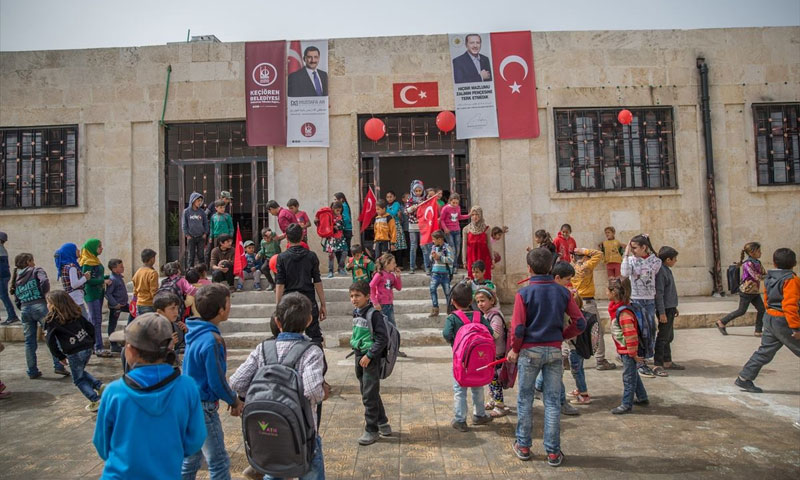Aleppo countryside – Assim Al-Mulhem
After his displacement with his children from Homs to the city of Saraqib in the southeast of Idlib Governorate, Maher al-Owaid went with his children, in a second displacement, to the city of al-Bab in the eastern countryside of Aleppo before the Syrian regime forces’ takeover of Saraqib. After securing a house, Maher’s second step was to search for a school in the city to register his children so that they can continue their education.
However, Maher was surprised by the overcrowding in the city following the recent displacement. He first looked for a “public” school, but he did not find a vacancy because of the pressure of a large number of students, and this school was not among his priorities because it was also far from his new place of residence. This made him look for a vacancy in “private” schools. However, he could not register his children as the registration fees in these schools range between 100 and 150 Turkish liras (one dollar equals approximately six Turkish liras), in addition to the transportation fees to the school. The transition fees represented a further financial burden that he could not bear, as he stated to Enab Baladi.
Maher hoped that his son, who discontinued education for two years, would have access to schooling again upon his return to Saraqib. In contrast, Mohammad al-Homsi, among those who were displaced from the city of Homs to the Idlib countryside, managed to register his three children in the city’s public schools. Unfortunately, displacement has negatively affected their “school performance,” prompting him to enroll them in institutes for specialized courses so that they can catch up with their colleagues and “restore their excellence.”
The students’ discontinuation of education, as a result of the war conditions, such as bombings, in addition to the targeting of schools, suspension of the educational process, and frequent displacement of students are the essential difficulties that teachers face during their work.
Nazir Shawish, a third-grade teacher at Mohammad Zain Shehadeh’s primary school in Al-Bab city, is trying to pay special attention to the displaced students who have recently joined his class, because of the difference he noticed in their educational achievement compared to their colleagues from the city who have not discontinued education.
Nazir said in an interview with Enab Baladi that he has noticed that his displaced students are “weak” in reading and mathematics, which are “the most important” subjects in the primary education stage. Therefore, he focuses on these two subjects while teaching them.
The number of students coming from the countryside of Idlib and the western countryside of Aleppo is increasing daily. Ali al-Karz School received approximately 140 displaced students who recently arrived in the city. The school’s principal, Abdullatif al-Issa, expects that this number would increase “more” in early March, after the Directorate of Education issued a circular to receive all new students without a limited specified number, even if their names in one class exceeds 50, 60, or 70 students.
In addition, each school in the city has been provided with two prefabricated classrooms (caravans) that have been fully equipped to receive the most significant number of students, according to al-Issa.
Al-Issa said that schools in the al-Bab city receive displaced students with simple registration procedures. The registration of the student requires a personal ID that he extracts from the city’s local council, intending to register students through the number on the ID, of the “YÖBİS” e-learning system that Turkey has set to link all schools to the Directorate of Education and the Office of Civil Status under one policy.
In the absence of any ID, it can be replaced with an identity proof issued by the local council, such as a certificate, a personal identity card, or a family statement.
Al-Issa added in an interview with Enab Baladi that his school is currently accepting the registration of students on a conditional basis due to the increasing pressure on the Office of Civil Status to obtain personal ID cards. This means that the student registers in the school and provides it later with the ID card immediately after receiving it within a maximum period of three weeks. The school aims by this initiative to facilitate the entry of students to pursue their education as quickly as possible.
While the school offers facilities for registering students, teachers suffer from difficulties while teaching students who have discontinued education for some time, five or six years. Al-Issa indicated that it is possible to resolve the students’ lack of sufficient knowledge, compensate them for what they had missed, and catch them up with their colleagues after estimating the period of their interruption from the educational process and evaluating their academic levels.
To obtain information about the adopted registration mechanism for displaced students, the capacity of schools, the number of students in al-Bab city schools, and the existence of compensatory educational programs, Enab Baladi contacted the Director of Education in al-Bab city, Jumaa Kazkaz, and the education official of the local council, Fawzi al-Sayeh, but it did not get an answer.

